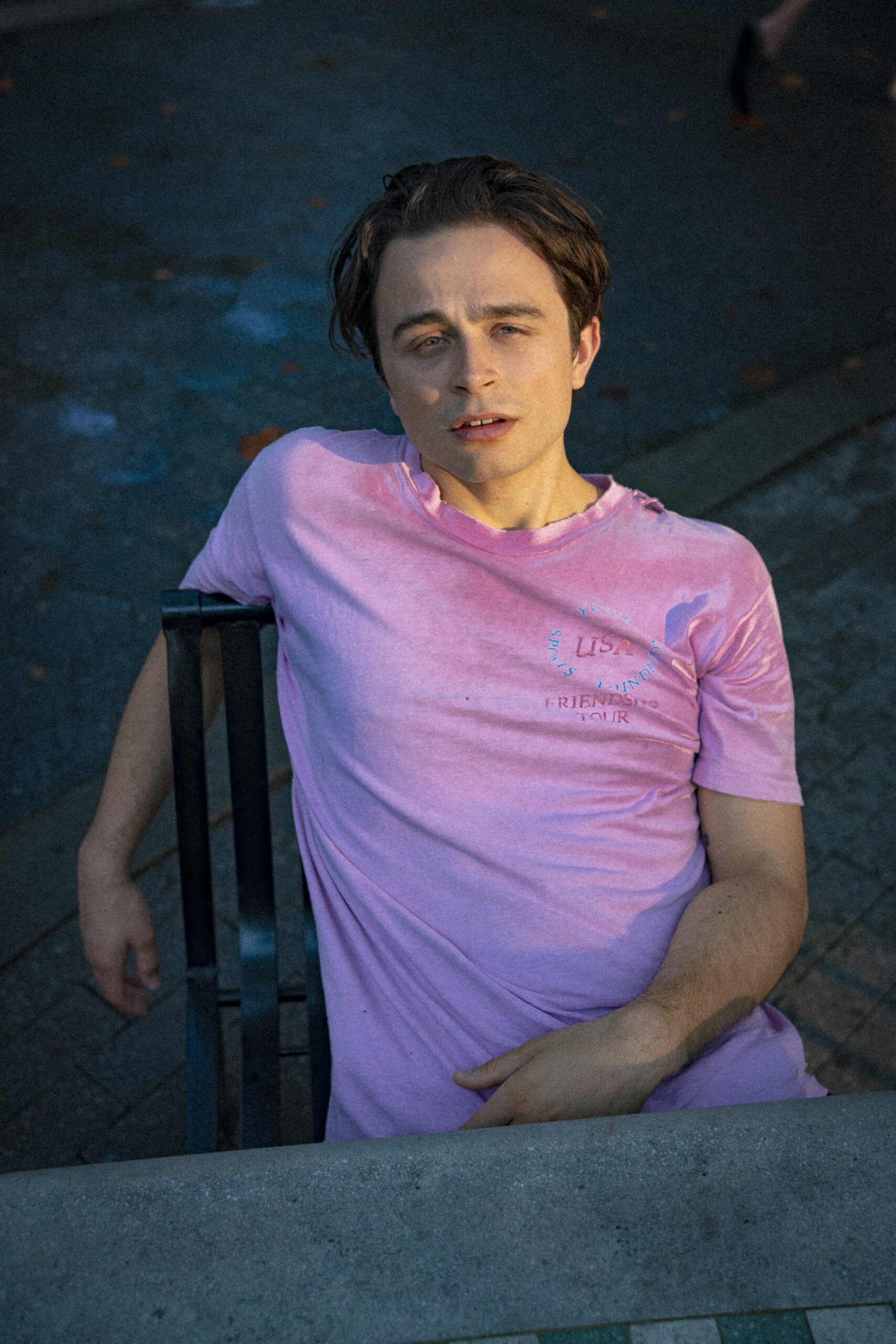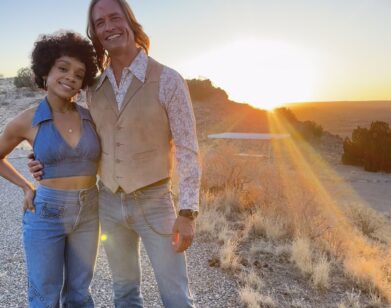IN CONVERSATION
“I’m the Clock Twink”: Ben Ahlers Tells Kiernan Shipka About Growing Up on The Gilded Age
Both Ben Ahlers and Kiernan Shipka have had the unique experience of being one of the youngest actors on the set of a beloved, long-running period drama. For Shipka, of course, it was Mad Men, in which she played Sally Draper from the ages of seven to 15. And for Ahlers, now 29, it’s been HBO’s The Gilded Age, the glossy upstairs-downstairs drama of 1880s New York which aired its season three finale this past weekend. There, Ahlers plays footman and watchmaker Jack Trotter, though the show’s rabid online fanbase refers to the character with an amusing shorthand. “Apparently, you’re the clock twink,” Shipka said when she got on a Zoom call last week with her former Chilling Adventures of Sabrina co-star. Below, two of the industry’s most captivating young actors get deep about snacks, wrestling, and growing up on television.
———
BEN AHLERS: Hey Keeks.
KIERNAN SHIPKA: How are you?
AHLERS: I’m so good.
SHIPKA: Where are you right now? Actually I have your location, so I don’t know why I asked that. I know where you are. [Laughs]
AHLERS: Every morning I check it.
SHIPKA: By the way, I love sharing my location with people. It’s my new favorite thing to do.
AHLERS: Totally. I kind of go in and out. I’m in Greenpoint right now. This morning I had therapy and now I have this, and so I think by the end of today I’m going to be completely healed.
SHIPKA: Gorgeous. How was therapy?
AHLERS: It was good. I’ve been journaling a lot more.
SHIPKA: Oh, love that. Are you writing or are you typing the journal?
AHLERS: I’m handwriting.
SHIPKA: That’s powerful.
AHLERS: But I’m also pretty active in the notes section lately. David Lynch talks about how there’s nothing worse than losing an idea, so I’m trying to just get everything down.
SHIPKA: My notes app is very jumbled right now. It’s like, grocery lists but then some really sad sentence that I also think sounds elegant. Do you ever journal as your characters?
AHLERS: That’s a good question. I did it on an indie a couple of years ago and I found it to be really fun in the moment, but then I felt like I was bringing too many ideas to the room. Like, “He wakes up at seven, not nine, so can we have a conversation about when the alarm clock goes off?”
SHIPKA: Right. Speaking of clocks, apparently you’re the clock twink.
AHLERS: I’m totally the clock twink.
SHIPKA: What’s your relationship to the socials? Because people go nuts over The Gilded Age and your character. Do you follow what people are saying?
AHLERS: I’m trying to give myself some grace over that temptation. Fortunately, working right now really keeps the main thing the main thing. But it’s nice to check in a couple days after Sunday, because you have the loyalists watching it at nine o’clock every Sunday and then you have the people who are late to the party, and that’s when you start to really feel it. But I’ve actually started using… Have you ever heard of Brick?
SHIPKA: That’s a device where it sort of locks up your phone, right? But I don’t know how it works. Tell me about Brick.
AHLERS: We’ll get into biohacking. [Laughs]
SHIPKA: This is an ad for Brick now.
AHLERS: Brick is a piece of hardware that you stick across the room or in a different room in your house, and you have to physically walk over there to unlock the apps that you’ve chosen to disable. So it gives you that second or third bit of recognition like, “Why do I need to log onto this?” And for the most part, it completely kills any desire to check. I’m like a week in and it’s been really helpful.
SHIPKA: Wait, where do you place the brick?
AHLERS: I place it on the front door of my apartment. So if I’m in bed reading a book and then feeling that impulse it’s like—
SHIPKA: You’re not going to get out of your cozy, cozy bed.
AHLERS: Totally. But having just done theater this summer, I do really miss the feedback. Unless you’re at a premiere, or unless somebody on the street happens to have watched the show, you don’t really get to have that engagement with the audience. So it’s a balance of trying to protect your attention while also engaging with the people who love the work. How did you deal with that with Sabrina?
SHIPKA: I think it was the same thing where I was working for a lot of it too, so it was really fun to check in. I felt like for some reason that I struck a good balance with it. I didn’t have a Brick or anything like that, but it all felt very positive. I don’t know why I managed that or how I pulled that off, but I kind of did.
AHLERS: Totally.
SHIPKA: Speaking of Sabrina, that’s where we met! I tell this story all the time, but now I’m telling it for Interview magazine. I remember it was November of 2019 and we were about eight months into the second round of shooting. I had been around the same people for like eight months, and all of a sudden at this table read for the next episode and I looked across the way. I was like, “Who is that? That is the cutest, most magnetic boy I’ve ever seen.” I feel like it was kind of love at first sight vibes.
AHLERS: It was.
SHIPKA: We didn’t even really speak, but I just looked at you and I just knew that I was going to have a long, beautiful friendship with you, and my intuition was right.
AHLERS: You’re spot on.
SHIPKA: We had maybe two weeks of filming together, and within those two weeks you got The Gilded Age, and I remember we were going to a hockey game and you were literally hanging up the call with your agents where they told you that you got it. I can’t believe that it’s been that long.
AHLERS: I know, I know. Especially in your twenties, you go through so many chapters so quickly.
SHIPKA: You were 23 when you started?
AHLERS: Yeah, 23. I was 22 when I auditioned.
SHIPKA: Oh my gosh.
AHLERS: And now I’m turning 29, you know? So it was a weird opportunity to let the character grow up, but then also have to figure out the younger self in me and bring him back to the table.
SHIPKA: That’s such a blessing of TV. I felt that with Mad Men, I felt that with Sabrina, where by the time that your character is doing something that feels like a change or feels heavily emotional, you’ve already been in their shoes. And it’s such a specific, special thing, because I feel like a lot of times, work and acting is coming up with a story and a past and all that, but when you actually have lived it… Can you talk about that?
AHLERS: So specifically within The Gilded Age, leaving the very cast members that I had been spending every day with had this very meta and easily accessible sense of loss. I’ve looked up to many of those cast members for such a long time, and they would take on parental roles off-screen, so it made the work very easy. I don’t know how you felt about Mad Men and Sabrina, but if you get the chance to run a show for two, three seasons, not only do you get that sense of linear timeline, but you also start to form a relationship with the character as a separate thing from you.
SHIPKA: Yeah, yeah.
AHLERS: There was an extra layer of this pride for the character. As he was leaving me, Ben, I was so proud and sad and scared for him, so I was able to welcome that into the scene as well. But it doesn’t have to be a one-to-one substitution. It can just be your present sensitivity to the moment. I feel so lucky to be the steward of Jack. I think he’s such a good person and role model. So a lot of the work was just being happy and scared for him.
SHIPKA: Can you talk a little bit about your relationship with your character? Because I feel that too. Those scenes are so tender and beautiful.
AHLERS: We’ve had some really long breaks in between shooting, so when you’re walking back to a character, you have to throw on his clothes again, and some of those clothes didn’t fit me this season. So there was this really tangible shift and separation from Ben and Jack. It’s hard not to get too actor-y about it, but I left Iowa and moved to New York. He’s leaving everything he’s ever known to go pursue a dream, right? The 1880s and 2020 are very similar in how quickly everything’s changing and how people feel so lost, so there has been this kind of step-for-step identification and relationship between me and Jack. And when you shoot it for nine months and then it comes out five months later, I do feel this sense of disorientation. It’s such a distortion to sit on your couch and watch yourself on television.
SHIPKA: Yeah, it’s a wild thing. I’m also so excited for you and your theater moment that you just had with Matt Weiner and John Wilkes Booth: One Night Only! How was it?
AHLERS: New plays are terrifying.
SHIPKA: What was the process like?
AHLERS: We did a reading at The Players Club two summers ago.
SHIPKA: Oh, wow. So this has been a minute. Did the writing change much throughout? Because Mad Men was so word for word. I remember if you said “they’re” and it was “they are,” someone was running to you being like, “It’s they are.”
AHLERS: Totally. So there were a couple of things. One is that in theater these days, there’s a lot of pressure to cut things and to really start to streamline it, and we did quite a bit of that. Matt was very liberal, and he really understood and was very effective at trimming it to make sure that the plot really rolled. Because audiences don’t have the same attention that they have that they used to have.
SHIPKA: Is it one act, or is there an intermission?
AHLERS: It is one act. It was like, “We don’t want to take an intermission. We kind of want to just steamroll this really complicated and subversive and intense play.” But his writing is so good that when you tried to pull one of the Jenga pieces out, it would affect the rest of the play. That thing was bulletproof. It did not want to be cut. It did not want to be trimmed. So it was really cool to watch him watch him do that. And I’m the narrator of the play, so there is a bit of fourth wall engagement. And Matt was there the whole time. It was his first play, so I think he really got his feet wet and I think he’s really hungry for more.
SHIPKA: That’s incredible.
AHLERS: And he’s obsessed with you.
SHIPKA: That’s so kind. I mean, he really trusted me at an insane age to be trusted with dramatic material on a television show, and I really owe so much to him. Can you say what you’re working on right now? Because I have friends on it and it sounds so fun.
AHLERS: It’s so silly, dude. I get to clown in a way that I got to do a little bit in Sabrina.
SHIPKA: It’s hard comedy, right?
AHLERS: Hard comedy. And there’s so much freedom in filming and just and letting the masters of improv, like Eric André and Sherry Cola and Caleb Hearon, obviously.
SHIPKA: Oh my god. Sweet, sweet Caleb. One of my favorite people in the world.
AHLERS: There is a Kiernan Shipka-shaped hole in our banter and we are doing our best to fill it. But yeah, John Cena plays a reality real estate TV star.
SHIPKA: Unreal.
AHLERS: He’s married to Michelle Monaghan. And his life is upended when his little brother, Eric André, comes barging into his life. And I play his reality show nemesis, so I get to go blows with John in every scene. And his schedule’s insane. He’s still doing the WWE while filming. And he’s playing more of a straight man in this, and he knows how to let other people get the laugh in a way that’s so professional and informed. And he’s so quick and a great leader on set. It’s directed by Matt Spicer, who did Ingrid Goes West.
SHIPKA: Oh, I love Matt Spicer. So fun.
AHLERS: We went to the WWE on Sunday.
SHIPKA: How was that?
AHLERS: I realized that WWE is drag for straight people.
SHIPKA: Oh my gosh.
AHLERS: It’s unbelievable. It was at MetLife. John was defending his WWE belt. It’s like group theater, and the fans have been following these storylines for 25 years. It’s so camp and so silly and there’s a collective unity and theatricality that I think we could all learn from. It was so fucking fun.
SHIPKA: That is amazing.
AHLERS: I’m kind of hooked. We’ll have to go.
SHIPKA: It’s a date.
AHLERS: Wait, so are you going to do theater?
SHIPKA: I want to do theater with you.
AHLERS: Yeah?
SHIPKA: That’d be so fun. Are you kidding? Wouldn’t that be the dream?
AHLERS: Totally. And I’m so excited for Industry. I am obsessed with that show.
SHIPKA: It’s going to be wild. I just wrapped a couple days ago. This whole season… no one’s ready.
AHLERS: Really?
SHIPKA: It’s absolutely bonkers, but in the best way.
AHLERS: Who do you play?
SHIPKA: I don’t think I can say. But it’s very Industry. It’s very crazy. And the writing is so smart. It’s one of those things where you read a scene once and you get it, and then you read it again and there’s another layer, and then the more you read it, the more you study and analyze it, the more layers you are just peeling back. It’s like every scene is this massive onion, and it’s so gratifying to be able to crack the code on a scene.
AHLERS: Was there quite a lot of rehearsal time?
SHIPKA: No rehearsal. I mean, it’s so TV in that way, where there’s no rehearsal, the camera’s up in five minutes, and you’re just going. You’re shooting six pages a day, sometimes eight. And everyone is so talented and so good and knows their characters so intimately that it’s just incredible to see everyone just turn on like it’s go time. Which is also kind of why theater is also so appealing to me, because you get to do it again and again and again.
AHLERS: Sometimes when I’m alone in the apartment, I’ll start doing John Wilkes Booth again, just because I love the lines so much.
SHIPKA: I love that. Wait, final questions. What was the last dream you had, and what are your favorite snacks?
AHLERS: What was the last dream I had?
SHIPKA: If you care to share.
AHLERS: I had a dream that I was skydiving and I had this guy on my back, and we were about to jump out of the plane and I was like, “I don’t have a parachute.”
SHIPKA: Oh no.
AHLERS: And he’s like, “You don’t need one. I’ve got one.” I was like, “But I think I need one, because what if yours goes out?” He goes, “No, no. You don’t need one, I’ve got one.” He pushes me out of the plane. And we got separated while falling, and then we got back together and he was able to parachute me and then we landed safety. And I was talking with my friend Stella about it the next day and I was like, “It was really scary.” And she was like, “Sounds like you need to trust.”
SHIPKA: Yeah, that sounds like a faith dream.
AHLERS: Yeah. I think when life feels like it’s moving fast or when there’s a lot of change, that sense of being able to rely on friendship and the helping hands of people around you is a tricky thing. So that was a pretty profound one.
SHIPKA: Dreams are so cool how they just make themselves so obvious sometimes.
AHLERS: Yeah. Right on time, too. And then my snacks. I’m embarrassed that I eat a lot of RXBARs.
SHIPKA: You’re still on the RXBAR thing?
AHLERS: I’m definitely still on the RX bar stuff. But I recently started dating a cook, so I have less need for snacks because I’m eating so good.
SHIPKA: Oh, that’s so nice.
AHLERS: A good white bean stew will change your life.
SHIPKA: Let’s get legumes back in the conversation.
AHLERS: But part of the reason my snack game is a bit lacking is because you are my snack guru.
SHIPKA: I know. You’ve got to come over to the Shipka household.
AHLERS: What do you got going right now?
SHIPKA: I’m doing a lot of cereal right now. And I’m forever a popcorn person. I’ll just never change that. But sometimes I add to it. Sometimes I put nutritional yeast or parmesan on top of it now.
AHLERS: Kiernan’s out here breaking the form.
SHIPKA: Putting extra salt on it, or garlic powder. You need to shake it up.
AHLERS: Totally. That’s been a shift. I’m starting to take a little bit of ownership over my food.
SHIPKA: Well, what a beautiful chat. I could just keep going for hours.
AHLERS: Literally I can’t imagine a better way to spend a Friday afternoon.
SHIPKA: This was an injection of life.
AHLERS: Love you. And we’re going to work together again as soon as humanly possible.
SHIPKA: And then again and again and again.











